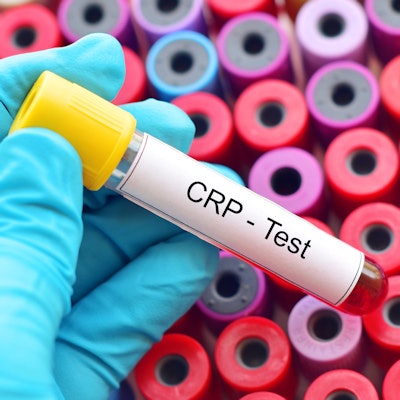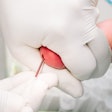
Investigators tried and failed to use C-reactive protein (CRP) as an inflammatory biomarker for picking patients with bipolar depression for drug treatment in a small study published May 8 in JAMA Psychiatry.
The results leave the potential role of CRP as a biomarker up in the air. They also highlight the broader challenges in developing biomarkers and personalized treatments in the field of psychiatry.
In a 12-week prospective study of 60 outpatients with bipolar disorder selected based on the presence of inflammation -- as measured by CRP or phenotypic markers such as obesity -- there was no significant difference in the reduction of depression symptoms for the tumor necrosis factor (TNF) blocker infliximab (Remicade, Johnson & Johnson) versus placebo, the primary end point of the study, researchers at the University of Toronto and Stanford University reported.
The study also looked at childhood maltreatment as a secondary end point. In a post hoc, exploratory analysis, the researchers found a significant reduction in symptoms with infliximab versus placebo in a subset who had been physically abused, as opposed to those who had been physically neglected or sexually abused. This finding is noteworthy, though a secondary outcome of the trial, wrote first author Dr. Roger McIntyre of the University Health Network in Toronto and colleagues.
The group suggested that the study provides proof of concept for developing interventions targeted at inflammation in mood disorders.
"A future study could introduce a more complex biosignature characterization and enrichment for inflammation among patients deemed potentially to be eligible and more responsive to an anti-inflammatory treatment," the researchers wrote.
Using CRP to investigate inflammation connection
The rationale for the study was evidence showing a relationship between neuroinflammatory disturbances and the onset of disease as well as with treatment response in psychiatric patients -- these have been attributed to a range of factors including physiological changes associated with the disease and exposure to childhood adversity, McIntyre et al wrote.
"Available evidence indicates that childhood maltreatment is associated with immuno-inflammatory activation extending into adulthood," they noted. "The most replicated increase in proinflammatory markers among persons reporting childhood maltreatment are CRP, interleukin-6, and TNF."
Meta-analyses and interventional studies have shown effects of anti-inflammatory therapies on symptoms in patients with bipolar disorders, and there has been research interest in identifying subsets who respond to particular drugs. McIntyre et al's prospective study was designed to investigate the post hoc findings of a study that showed that infliximab was not efficacious for treatment-resistant depression overall, but there was a treatment response in a subset with CRP of 5 mg/L or higher at baseline (JAMA Psychiatry, January 2013, Vol. 70:1, pp. 31-41). Hence, CRP had potential as an inflammatory biotype that could be used to help select treatments.
"To our knowledge, no study has previously evaluated whether individuals with bipolar disorder enriched a priori on the basis of biochemical and/or phenotypic immuno-inflammatory activation would differentially respond to an anti-inflammatory agent for the treatment of depressive symptoms," the authors wrote.
The patients enrolled in the study met the criteria for bipolar I or II disorder using the Diagnostic and Statistical Manual of Mental Disorders-5 (DSM-5). The primary end point was response at 12 weeks to infliximab versus baseline, based on the Montgomery-Asberg Depression Rating Scale (MADRS). History of childhood abuse was assessed with the Childhood Trauma Questionnaire. Infliximab was generally well tolerated, the researchers reported.
Participants needed to have a baseline CRP of at least 5 mg/L or have another marker of inflammation, such as obesity, increased levels of triglycerides, or inflammatory bowel disorder. The researchers noted that they decided to select comorbidities as a proxy of immunoinflammatory activation for pragmatic reasons -- that is, to speed trial recruitment. They explained that this was "supported by data implicating proinflammatory changes as both the cause and the consequence of these conditions," but they also acknowledged that the lack of a direct proinflammatory measure for all participants was a limitation of the trial.
Editorial suggests inconclusive results
An accompanying editorial in JAMA Psychiatry, also published online May 8, called attention to the study's failure to show a reduction in depressive symptoms and the value of selection based on high CRP at baseline. The post hoc finding that the participants who had a history of childhood physical abuse had a greater reduction in depression symptoms "needs to be interpreted cautiously" in light of the small sample size and high placebo response rates observed in the study, Dr. Michael Berk, PhD, of Deakin University in Australia and colleagues advised in the editorial.
"As such, it is unclear if this is a true negative trial or a failed trial," they wrote. "It is also unclear if this is a repudiation of infliximab alone or if this finding is generalizable to other antibody therapies."
Differences in CRP at baseline for the infliximab versus placebo cohorts also muddy the waters in interpreting the results more broadly. Berk et al noted that 43% of the placebo patients versus 35% on infliximab specifically met the CRP inclusion criteria (5 mg/L or above) at baseline.
"Notably, while not statistically significantly different from the placebo group (p = 0.09), the mean, age-adjusted CRP concentration for the infliximab group was also less than 5mg/L at baseline," they added.
Precision medicine remains elusive
The results are disappointing considering there has been what the editorial authors described as a "significant lull" in psychiatric drug development since the 1980s and 1990s, "when most of the monoamine-targeted therapies that form the foundation of modern practice were first launched."
"Instead, some of the most promising novel therapies have arisen from the twin biomarker findings of increased inflammation and oxidative stress across the major psychiatric disorders, including depression, schizophrenia, and bipolar disorder," they wrote. "Research on inflammation and oxidative stress has led to the identification of promising repurposed therapeutic options, which include celecoxib, minocycline, N-acetylcysteine, statins, aspirin, and infliximab."
Inflammatory and oxidative biomarkers theoretically have potential to direct treatment, but poor sensitivity and specificity have "hampered attainment of this goal." The same biomarkers may be present in a range of psychiatric disorders and other comorbid medical conditions. And it's still unclear which biomarker is best for testing the effects of anti-inflammatory treatment, Berk et al wrote. Precision medicine in psychiatry has been a much-hyped area of promise, but tailoring treatment to individuals to improve outcomes "remains an attractive yet elusive goal," they concluded.











